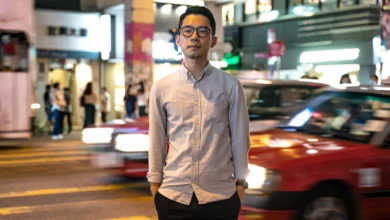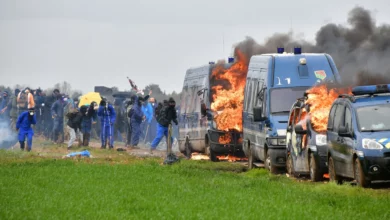As the dust settles on four days of clashes between protesters and the police around the Interior Ministry, students and activists are preparing for a different form of protest on Saturday, the day that will also commemorate the fall of President Hosni Mubarak last year.
Egyptians are being encouraged not to go to work, pay bills or taxes, or attend university lectures — and to engage in any form of non-violent opposition to the authorities — until the SCAF hands over power
The call for civil disobedience was born out of the anger at the death of 74 football fans, most of them Ahly supporters killed after an away match with Port Said's Masry on 1 February. But it has also been a reminder for some that Mubarak's fall a year ago was only part of the fall of the regime. The perception that the regime lives on under the stewardship of Field Marshall Hussein Tantawi, has fueled months of protests against the ruling Supreme Council of the Armed Forces.
An end to military rule and justice for the revolution’s martyrs are the central demands behind the call for civil disobedience.
Other, individual demands are also being made. Some labor groups are calling for a minimum wage of LE1,500. The Federation of Independent Trade Unions is calling for the resignation of Attorney General Abdel Meguid Mahmoud — regarded by his critics as a Mubarak stalwart — and the formation of a revolutionary tribunal to try "the old regime and all its branches that are spread through all the institutions and which continue to carry out the policies of the old regime."
Students at some 40 universities have expressed an intention to join the strike on 11 February, and other activists, political parties and labor groups have since adopted the call.
The Century Foundation analyst Michael Wahid Hanna describes the SCAF's limited concessions as an attempt to "blunt dissent without fundamentally altering their roadmap for transition" — according to which they will hand over power in June following presidential elections.
Revolutionary protesters have paid a costly price for their recalcitrance in the form of hundreds of fatalities, and the SCAF concessions have rarely reflected that loss of life; this week — after 12 people were killed in clashes outside the Interior Ministry — the council announced that nominations for the presidency would start in March, but declined to set a specific date for the elections themselves.
That civil disobedience allows people to engage in resistance without putting their personal safety at risk is its advantage, activist Tamer Mowafi told a seminar this week.
"It is an alternative to the exaggerated form of violence we have witnessed that has been extremely costly in both lives and money for those living near the site of the protest,” Mowafi said.
Political analyst Ramy Yaacoub suggests that this might be the "last peaceful option of protest for citizens who want retribution for lives lost."
The catch is, Yaacoub says, "With this style of protest you need a larger demographic to respond for it to be effective."
Where this doesn’t happen an action quickly risks fizzling out, as was the case on 6 April 2008 when a group of activists made an online call for what they termed a general strike but which was essentially an invitation for civil disobedience. Very few people responded to the call, and it is likely that the day would not be remembered at all were it not for the violent clashes between police and residents of the industrial town of Mahalla following the collapse of a planned strike there.
But after a year of bloody protests, political instability and incessant hand-wringing about Egypt’s sinking economy, will the general public respond to the call?
Hanna suggests that the success of civil disobedience campaigns largely depends on "their sustainability and ability to not alienate the broad swaths of Egyptian society that are cautious and concerned about their security and livelihoods."
The importance of sustainability is a point echoed by activist Sherief Gaber, a member of the alternative media collective Mosireen.
At its best, Gaber says, civil disobedience is a tactic that “deepens with time, as it builds momentum, allies and starts mounting pressure in the long term."
Gaber drew an analogy to the Tahrir Cinema screenings in early 2011, when scenes from the revolution and army abuse were shown on a large video screen in Tahrir Square. Out of this grew the Kazeboon (Liars) Campaign, in which activists use videos to demonstrate military violence against protesters, showing the films across Egypt rather than confining the movement to the square. The civil disobedience call decentralizes protest in the same way, Gaber suggests.
"There are lots of ways to say 'no.' The trick is to start discovering them," Gaber said.
A crucial component in the success of 11 February is to what extent workers respond to the call, several commentators said, especially those from certain sectors which could turn the action into an effective pressure tool.
Activist Emad Mubarak, head of the Association for Freedom of Thought and Expression, said that without workers, "civil disobedience has no meaning."
While some online activist groups have used the terms "civil disobedience" and "general strike" interchangeably to describe 11 February, labor activists stress that there is limited mobilization in the labor sector for the day.
"Workers' representation will be weak because workers regard 11 February as an arbitrary date; it hasn’t been called for by trade unions but rather by activists disconnected from the labor movement," socialist activist Tamer Wageeh said.
This is a point underlined by American University in Cairo lecturer and political activist Rabab al-Mahdi, who told Al-Shorouk daily on Tuesday, "A call for civil disobedience is not a random decision publicized on social networking sites. It’s a state of steadily growing strikes, protests and sit-ins that lead in the end to civil disobedience."
But after nearly a year of a drawn-out, chaotic transition, some activists are understandably frustrated at the pace of change following the whirlwind of the 18 days last year.
"I think the key to understanding the current political dynamics is to recognize that the moment for revolutionary change has passed and been diverted to the more prosaic realm of politics," Hanna suggests.
The "prosaic realm of politics," in the form of the Muslim Brotherhood whose Freedom and Justice Party has a plurality in the lower house of Parliament, is meanwhile lobbying hard against the call for civil disobedience.
Brotherhood Secretary General Mahmoud Hussein described the push for civil disobedience as a "destructive action" and called on its organizers "to listen to the sound of reason, wisdom and logic, and to place public interests above any trifling, limited interests."




